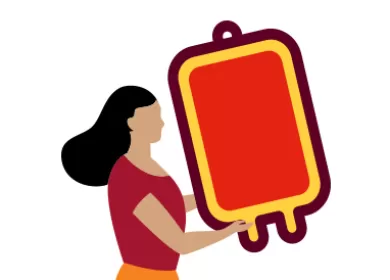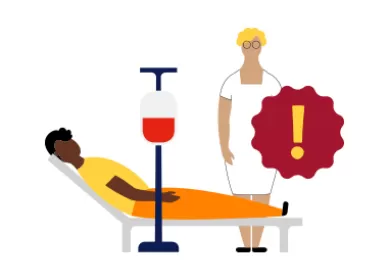Before any medical procedure, you have to give your consent – and blood transfusion is no different. You should feel comfortable that you have enough information to know whether you need a transfusion or not. Find out more about your condition and all the treatment options to make an informed decision.
What to ask your doctor
Choosing Wisely Australia® recommends five questions to ask your doctor before you (or a family member) get any test, treatment or procedure.
- Do I really need this test or procedure?
The decision to have a transfusion is made by balancing the benefits against the risks. Sometimes the benefit isn't always immediately obvious, like when platelets help prevent bleeding if your count becomes very low. By asking your doctor, they’ll be able to explain the specific benefits and risks for you and your situation.
There may be safer options available, like treating iron deficiency anaemia with supplements instead of a transfusion. Or, there may be things you can do to avoid a transfusion.
- What are the risks?
Most people don’t feel any different during a transfusion. Reactions are uncommon, and usually mild. However, some rare, but serious reactions can occur. Find out more about all the transfusion risks.
- Are there simpler, safer options?
Sometimes, there’s an alternative treatment, but it depends what kind of transfusion you need and what you’re treating. Your doctor can provide the best advice on what the safer options might be.
- What happens if I don't do anything?
Choosing not to have a blood transfusion may have serious consequences in some situations. It’s really important that you have all the information and understand what those consequences are for your circumstances. Ask your doctor any questions you might have.
Whether it’s for personal or religious reasons a competent adult is entitled to refuse a transfusion. It’s also OK if you’re happy to receive some blood products but not others. It’s your right to choose.
Make sure your choices are communicated with your medical team.
- What are the costs?
Nothing. You won’t be charged for a transfusion in a public or private hospital because Australian blood products are funded by the state and federal governments.
However, if you look closely at the label on a blood product you may notice it shows the manufacturing cost. While blood donation is voluntary, collecting, processing, testing and distributing blood and blood products can get expensive. The cost is there to remind health providers of those costs, and that blood is a precious resource given by generous donors. It should be used and managed with care.
A bit more about consent
Before you receive a transfusion, you (or a family member) need to give your permission or consent. It's the same for any medical procedure. To make decisions about your transfusion, you must have enough information about your condition and the options you have.
Just remember:
- Your consent must be voluntary.
- You must have the capacity to be able to make the decision.
- You must be able to understand the information.
- You must have information on the treatment including benefits and risks.
- You must be aware of which blood products will be transfused.
- You must be aware of how the transfusion will be given and how long it will take.
- Be sure to ask questions if there’s any part of your treatment that you don't understand.
 Transfusions in children and babies
Transfusions in children and babies
We understand that having a child in hospital is a really difficult time for everyone in the family. These information booklets can help explain to your child what’s happening and what to expect.
Babies receiving a blood transfusion
Children receiving a blood transfusion
Yarning about blood
Consent information for Aboriginal and Torres Strait Islander patients
You may also like

Receiving a transfusion
Find out what to expect before, during and after your transfusion.
Receiving a transfusion
Transfusion risks
Most people feel fine during and after a transfusion, but there are some uncommon risks.
Transfusion risks

